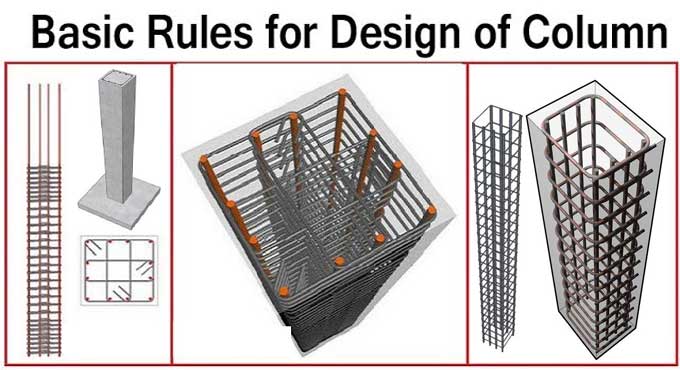TUTORIALS
Basic Rules to Remember before RCC Column Design

Before designing a column, it is important to make sure that one is acquainted to the following points with regards to column design.
1) Longitudinal Bars Percentage
Percentage of Longitudinal steel should be from (not less than) one percent to (not above) eight percent of cross sectional area.
As per ACI code:
Minimum steel = one percent
Maximum steel = eight percent
2) Number of Longitudinal Steel Bars
As a minimum 4 longitudinal bars should be utilized with in circular or rectangular ties.
As a minimum 6 longitudinal bars should be utilized with in spiral ties.
3) Tie Bar Size
According to ACI, #3 bar with respect to longitudinal bars up to #10.
On the other hand, #4 bar with respect to longitudinal bars greater than #10.
Message:
- #3 is equal to 3/8” diameter bar.
- #4 is equal to 4/8” diameter bar.
- #10 is equal to 10/8” diameter bar.
4) Least Tie Bar Spacing
Least tie spacing can be the largest of 1 inch (1”) or 1 longitudinal bar diameter.
In case, diameter of main bar is greater than 1 inch, in that case bar’s diameter could be considered as the least tie spacing.
In case, diameter of main bar is less than 1 inch, in that case, least tie spacing should be 1 inch.
5) Utmost Tie Bar Spacing
The highest or maximum tie spacing can be the smallest of
- 48d (48 times tie bar diameter).
- 16d (16 times longitudinal bar diameter).
- The minimum lateral column dimension.
6) Spacing of Longitudinal Bars
As per ACI, No longitudinal bar can be situated above 6 inches from other laterally supported bar.
Highest limit is 6 inches.
7) Size of Spiral Bar
As per ACI, spiral could not have diameter less than 3/8 inches. #3 can be utilized or may be larger.
8) Turn Height or Spiral Bar Pitch
As per ACI, the clear spacing of spirals should be between 1 to 3 inches.
To get more clear idea, go through the following video tutorial.
Lecturer: Engineer Boy
Read: Some important thumb rules for making the layout of any Column

